Lunch with Bermuda
Interview with Erik Warolin, director of Bermuda
Was the cafe based on a real one that you know? Where is it set?
The location is one of many restaurants we scouted. The most important thing for the story was that the café windows should be big enough for the car to be in the movie camera’s field of view during the whole conversation between the main characters. So it’s not any café or restaurant I ever went to but one that Sam Safinia, the producer of the film, actually spotted as he was working on another project. He showed it to me and I thought it was perfect. It is located one hour south of Stockholm.
Is Bermuda particularly significant as a location?
Well, it actually is something I thought about. Because the whole discussion at the table is obviously quite strange, and something you instinctively don’t believe to be true. So it was important that if you listened to what the woman actually says and not how she says it, it should sound reasonable. And Bermuda is ranked by Oxfam as the number one tax haven in the world. One more point about Bermuda is that many of us associate it to the dangers and mythology of the Bermuda Triangle, something I think would make the destination more adventurous.
The film has a dry humorous side. Would you say your other works have a similar tone? What other genres would you like to explore?
Even though I worked with TV-drama this is my first short film. So I can’t compare it to my other works as there are none. But regarding genre, I do feel that type of comedy is one of the most compelling. There is something interesting about telling a story that’s funny without telling a funny story, if that makes sense. Someone really smart (can’t remember who, might be Aaron Sorkin) once said that the hardest but most rewarding thing to do is to tell a serious funny story. And I cannot agree more.
Can you tell us a bit more about your background as a filmmaker?
My background as a filmmaker is quite different from many others. I studied economics, marketing and advertising at university. So I started in the advertising industry for a couple of years before I decided to really see if my passion for filmmaking could become a career. Then I got very lucky with a job at SVT Drama right off the bat ( the Sweden BBC drama ). There I worked with everything that I could get my hands on. It became my practical education. So I also happened to meet, learn from and work with brilliant professionals from different departments. So I worked there for a couple of years before I became a freelancer, working with tv-series, development etc.
Would you say that the short film format has given you any particular freedom?
Regarding the short film format I find it to be inspiring for a couple of reasons. Unfortunately none of them regarding freedom, in fact the opposite. Because I feel that if you are telling a short story your goal should be to make it short. And that is hard for many of us because we love to edit and add and edit and add. But when I watch many short films I feel that most of them (including mine) could and should be shorter. When watching a feature, 90-120 min, the audience knows the story beats, even if they don’t know that they know – they know. But because a short film can be 1-60 min the audience doesn’t know what to expect. They are trying to figure out what type of film they are watching. So we are asking them with every second to be patient. So we need to be very compressed and clear in our storytelling or they will get bored and stop paying attention. So with that in mind short filmmaking is both extremely inspiring and challenging.








